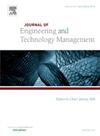Mutual perturbations in coupled exploration: Diverse impacts of feedback frequency and feedback timing
IF 3.9
3区 管理学
Q2 BUSINESS
Journal of Engineering and Technology Management
Pub Date : 2025-07-01
DOI:10.1016/j.jengtecman.2025.101899
引用次数: 0
Abstract
In the process of coupled exploration, when feedback from other teams comes in the form of disapproval, comments, and suggestions, teams may need to modify the existing technical routes or even abandon previous choices, which can perturb their ongoing exploration activities. We employ a multi-agent computational model to analyze the aforementioned processes. We have found that frequent perturbations among the R&D teams responsible for various subsystems can significantly impact the performance of coupled exploration, which is highly dependent on the speed at which teams search for better options and reach consensus. During the initial phase of coupling exploration, frequent perturbations permanently alter the trajectory of the exploration process. The reciprocal perturbation during the intermediate stage enhances the capacity for coupled exploration in subsequent stages, contingent upon the actor’s adeptness in swiftly discerning and selecting optimal strategies. When the team’s ability to identify the correct solution is weak, frequent early perturbations can result in increased divergence in feedback among teams. The presence of conflicting advice from other teams exacerbates the challenges faced by actors in making informed judgments based on feedback.
耦合勘探中的相互扰动:反馈频率和反馈时间的不同影响
在耦合勘探过程中,当来自其他团队的反馈以不赞成、评论和建议的形式出现时,团队可能需要修改现有的技术路线,甚至放弃先前的选择,这可能会干扰他们正在进行的勘探活动。我们采用多智能体计算模型来分析上述过程。我们已经发现,负责各种子系统的研发团队之间频繁的扰动可以显著地影响耦合探索的性能,这高度依赖于团队寻找更好的选择并达成共识的速度。在耦合勘探的初始阶段,频繁的扰动会永久地改变勘探过程的轨迹。中间阶段的相互扰动增强了后续阶段的耦合探索能力,这取决于行动者在快速识别和选择最佳策略方面的熟练程度。当团队识别正确解决方案的能力较弱时,频繁的早期干扰会导致团队之间反馈的分歧增加。来自其他团队的相互矛盾的建议加剧了参与者在根据反馈做出明智判断时所面临的挑战。
本文章由计算机程序翻译,如有差异,请以英文原文为准。
求助全文
约1分钟内获得全文
求助全文
来源期刊
CiteScore
8.00
自引率
6.20%
发文量
29
审稿时长
>12 weeks
期刊介绍:
The Journal of Engineering and Technology Management (JET-M) is an international scholarly refereed research journal which aims to promote the theory and practice of technology, innovation, and engineering management.
The journal links engineering, science, and management disciplines. It addresses the issues involved in the planning, development, and implementation of technological capabilities to shape and accomplish the strategic and operational objectives of an organization. It covers not only R&D management, but also the entire spectrum of managerial concerns in technology-based organizations. This includes issues relating to new product development, human resource management, innovation process management, project management, technological fusion, marketing, technological forecasting and strategic planning.
The journal provides an interface between technology and other corporate functions, such as R&D, marketing, manufacturing and administration. Its ultimate goal is to make a profound contribution to theory development, research and practice by serving as a leading forum for the publication of scholarly research on all aspects of technology, innovation, and engineering management.

 求助内容:
求助内容: 应助结果提醒方式:
应助结果提醒方式:


